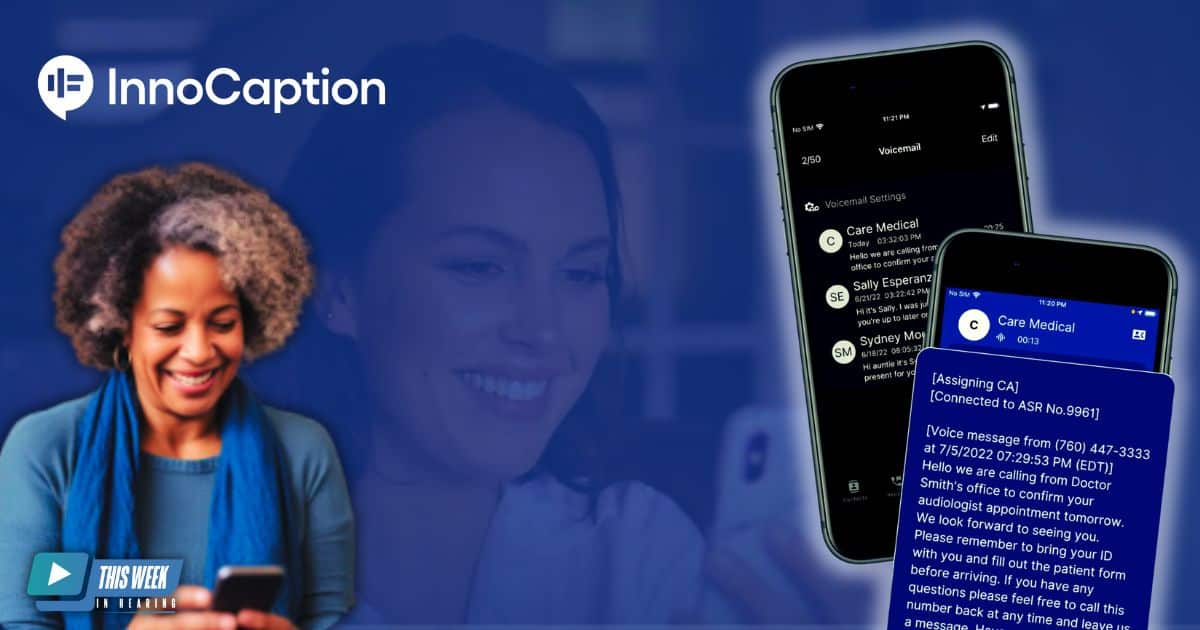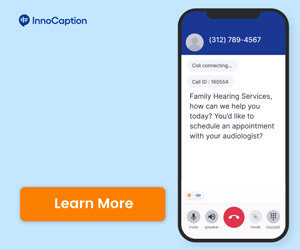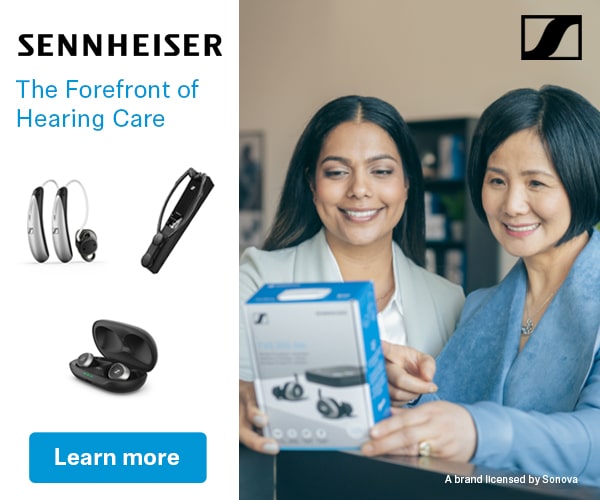Gael Hannan and Shari Eberts interview Dr. Barbara Weinstein, a distinguished professor at CUNY and adjunct professor at NYU Langone Medical Center. Dr. Weinstein shares her recent research on the InnoCaption app, which provides real-time captions for phone calls, making them accessible to individuals with hearing loss.
Dr. Weinstein highlights that many hearing professionals are not familiar with captioning apps like InnoCaption, despite their potential to greatly improve phone call experiences for hearing aid and cochlear implant users. Her research involved a comprehensive survey of InnoCaption users, focusing on both technological and psychosocial benefits. Key findings revealed that before using the app, users experienced high levels of frustration and anxiety during phone calls. However, after three months of using InnoCaption, participants reported increased phone usage, reduced listening effort, and improved emotional well-being. They felt more relaxed and confident, especially during important calls such as medical appointments.
InnoCaption, which is free and funded by the FCC, offers both live stenographer and automated speech recognition options, enhancing accessibility at no cost to users. Dr. Weinstein emphasizes the importance of audiologists inquiring about their patients’ phone call experiences and recommending tools like InnoCaption to improve their quality of life.
- For more details on the research, visit https://www.innocaption.com/white-paper
Full Episode Transcript
Welcome to This Week in Hearing. I’m Gael Hannan. And I’m Shair Eberts. And we’re the co authors of Hear & Beyond. Live Skillfully with Hearing Loss. Today’s guest is Barbara Weinstein, PhD, professor and founding executive officer of the health sciences doctoral programs at the graduate center CUNY. She’s also an adjunct professor of medicine at NYU Langone Medical center in NYC. Boy, that’s a lot of acronyms, but Barbara, thank you for being here today with us. You know, all three of us were recently at AAA, the American Academy of Audiology. And Shari and I had the pleasure of seeing you present some new research that you’ve done with the team at InnoCaption. It’s called from frustrated and discouraged to confident and content smartphone caption call experiences with the InnoCaption app. Everyone wants to be confident and content on the phone, but it’s not always easy for people with hearing loss, who often rely on visual information to augment the bits that they do hear. So maybe you can talk, Barbara, at first, how did this research come about? That’s an interesting question. Basically, I never heard of InnoCaption, as most audiologists, unfortunately, as of now, have not. But hopefully after this session, more and more will and I was approached by the InnoCaption team to assist them in developing, in expanding on or developing a survey of InnoCaption. users in terms of To assess the benefits they were experiencing using InnoCaption. And what was interesting is that they. First had a draft of survey questions. Which were very important in terms of the technology. And of course, I have a different bias. My bias is psycho-social. So I said, let’s add some psychosocial questions, knowing the kinds of issues that a lot of people with hearing loss experience. So they were intrigued by that. And the team said, this is great. Let’s just go with it. Let’s add those questions. So we added the psychosocial questions coming up with a very, very comprehensive survey. And we had no idea, you know, what the outcome would be, but I would say that we were pleasantly surprised with our findings. Well, then, that leads to my next question. What are some of the major findings that you can share with us from the survey? And the results? So what we found, which was very, very interesting, first of all most of the majority of people that we. Survey were experienced hearing aid users. We had a few that were also had cochlear implants. And we tracked them first at baseline before obtaining, before purchasing InnoCaption or using InnoCaption. And then we followed them for three months. And what we found, which was interesting. Is that majority of people Before using this, the InnoCaption app, were having difficulty on the telephone, even while streaming. Through their hearing aids. And then once they started using the app, they found that they were using the telephone more often and they were using the telephone with the cap – call captioning in many more situations that they found to be very, very beneficial. And most importantly what we found was that a lot of these individuals said that before using the call captioning app, they were feeling frustrated, they were feeling anxious they were using the telephone. And then once they started using the captioned call, they were more relaxed, they were less frustrated, they were happier, they were less, they experienced less listening fatigue and less fatigue. Less listening effort when they were using the app. Very, very surprising. And they were using it for important calls, like, more importantly, when they were calling for medical doctor appointments and, for example, Medicare. So they were using it in more different situations, always with family and friends, even if they had difficulty. But they added some of these other situations, which are very, very important for people for everyone when they’re calling physicians or healthcare providers. Absolutely. And you talked a little bit about listening effort. How important is this for people with hearing loss? How big of a deal is this? Well, we only just started focusing on listening effort a few years ago. And listening effort and fatigue are kind of inter-related. And the reason why listening effort is such a big deal is because when people with hearing loss try to focus so hard on listening and understanding what people are saying, sometimes that adds a lot of load to their brain. And sometimes it’s going to be hard for them, people to kind of both listen and remember what’s being said because they’re putting so much effort into trying to focus and understand that. And when listening that they’re, sometimes they’re not going to be able to kind of remember, for example, what people are saying. So the listening effort is just, it’s just easier if the signal, if you can combine vision and audition, it just takes a lot of pressure off of the brain and the individual. So you could be much more relaxed in a listening situation because, of course, we know combining audition and vision is so important. You know, even when we use masking, simulate – simulating, using a telephone without captioning. If you can’t see the lips, if you don’t have visual clues, you’re going to lose a lot of information. So this just adds so much more information. That’s, that we take for granted if we, for normal hearing people. But people with hearing loss appreciate how important seeing some of the sounds they miss are when they’re talking on the phone. For example, you know, listening to your talk right there and imagining if I were in this survey and having any visual information, such as I get through Facetime or captioning feel my stomach clenching frustration. You know, the emotions. You mentioned them earlier. How were people, their participants emotions? Tell us a bit more about how their emotions were impacted by the assistive technology. Okay, so that – that’s interesting that you’re reporting assistive technology. Reporting. This is assistive technology because I consider the closed captioning assistive technology. What was interesting is that in each, we divided the respondents into hearing loss groups. So we had people with relatively mild, difficult degrees of difficulty and people with more severe difficulty And what we found is that even people with relatively mild little difficulty, they were all experiencing, majority of these people were experiencing a great deal of fatigue when they were not using the captioning. They were feeling angry, they were feeling frustrated, they were feeling discouraged, dissatisfied without the call captioning apps. And then once they used the app InnoCaption, then they were much more confident, they were happy, and they were content. But what was most important is that, again, even the people with less significant levels of hearing difficulty were experiencing these negative emotions. Of course, the people with the more severe difficulty had more of these people experiencing more of these negative emotions. But all the groups were benefited and were more content and were happier and were more confident when they were using the whole captioning app. Yeah, I find that just from personal experience, anytime that there’s captioning available, I feel more relaxed, whether it’s on the phone or whether it’s on a Zoom call or whether it’s going into a meeting. Any situation where I feel like I have a backup really just takes that pressure off to have to hear everything perfectly. So I completely understand that. And I want to also add that was interesting is that after three months of using the call captioning app they ended up, majority of people, more people ended up using their telephones more frequently. So that frequency of use was also an added benefit because they felt it was much easier for them. They were much more relaxed when they were communicating using the call caches. You know, I think it’s interesting. This really speaks to especially for new time users expectations of what hearing aids can and can’t do. And even at cochlear implant level, that our expectation is that this hearing aid or sound processor is going to allow me to hear, and I won’t need to that it’ll solve the issue. When in reality, like you were saying, we need the combination. Most of us, I would say need that combination of auditory input and visual input. So this is a really fascinating aspect. So I would say that I’m going to just add to what you just said, Gael, and um, Your expectations have to be set by the audiologist. And the audiologist has a responsibility to try to inquire about how people are doing on the telephone especially when they’re wearing the hearing aids, because the audiologist expectations are that once you have the hearing aid, once it’s connected to the smartphone, you’re going to do okay, and I’m not going to even ask you about it. So what’s really, really important is that we. Expectations for audiologists and expectations for the people that we work, with, whom we work, are realistic, and that’s really, really important. So I’m, as part of this podcast, I want to just encourage audiologists to always ask if how people are doing on the telephone once they get the hearing aids and on the repeat visits, just to make sure they’re doing well or if they need additional assistance. Because most of these people, they were using their smartphone, they were streaming with their smartphones and they were not even aware of this captioning app. And once they got it, it really made such a big difference for them. So it’s really, really important that expectations on the part of the professional and the user, the end user, are realistic. Absolutely. I agree with you. And I agree with you also about learning about this from your audiologist. There’s so many things like Gael and I talk about all the time, how we didn’t learn about CART or we didn’t learn about a hearing loop until we went to, you know, an HLAA convention. And it would have been wonderful to know about these types of things. And these captioning call apps like InnoCaption, these are all just miracle tools. So I’m sure that there are some people with hearing loss listening today, and they might be saying, this sounds great, but how much does it cost? So can you talk a little bit about that aspect? Okay. For sure. So this is a free, FCC funded app that provides real time captioning for phone calls, making them accessible for individuals who self certify as having hearing difficulty. So you don’t have to prove that you have a hearing loss, you just have to self certify. And users can choose between live captioning by a stenographer in this app or automated speech recognition software. So it’s really very innovative in that you have this hybrid approach. There’s no cost to this. You can use your existing telephone number, and there’s also dual captioning mode so that it can caption the end user and also the person on the other end of the phone. So it’s two sided caption. So again, there’s no cost. That’s great. Unfortunately, I’m in Canada and this is not yet available in my country, but I live in hope. I live in hope. Barbara how can audiologists share this information with their clients? Well, I think the best way to, first of all, you have to assess, you have to ask the patient how they’re doing on the telephone. And we know from there was just a recent study that was just published about cochlear implant users, and what they found is that the use of the telephone is just such an important assistance technology for distant relationships, which are so important. So telephone use is important for engagement, it’s important for relationships, and we know that having relationships is protective against a lot of cognitive decline, against other, along with other things. So we have to ask our patients about their engagement. Are they seeing people in person? Are they speaking to people on the phone? And we have to ask about their difficulty. And if they are having difficulty, we can. We can. The audiologist can demonstrate the app in their office. So there’s a way for the audiologist just to sign in and demonstrate the app to their patients, which is what I would recommend, and then refer them to the site. So it sounds like it’s really easy all around, right? It’s easy for the end user, it’s easy for the audiologist. And that’s good news. So going back to the survey for a minute, were there some things that just were very surprising about the results? What surprised you all the most about some of the questions that you asked? Well what I think surprised all of us, happily, was the shift in stress related emotions associated with, with making smartphone calls. I mean, I was, I mean, I was, I was so surprised and so pleased that we added those questions. And it was really quite, I’m still amazed at how beneficial this call captioning app was for so many people. It was just really, it was so impressive and it made me feel so good about the fact that we have something, we have outcomes that really are benefiting the people that we work with, and that’s what we want to do, help them, help make their quality of life better. So to me, it was just that those outcomes were, that’s why I meant, that’s why I started in this field, to help people live a better life. And then finally, I mean, we have a lot of interventions, but this one was inexpensive, it doesn’t cost anything, and it seems to really be beneficial. I love that. So, any final thoughts you want to share with the viewers? Well, I just the viewers who are audiologists, I just really encourage you to make sure to ask your people you work with on a regular whenever you see them, even if it’s yearly. Just make sure you inquire about how it is, how they are doing on the phone. Are they using the phone? Frequently enough. Do they have any difficulties? And if so encourage them to try this app and download the app and try it for yourself, and you’ll see that you’ll experience the benefit and maybe even shares. Like I have a one page handout describing the app, how to access the app, and some of the benefits of the app. In fact, it just, I was reading in one of my many journals that I read, InnoCaption was hailed one of the best apps, the best app for people with hearing loss. Top pick in terms of call captioning. So that was kind of nice to see. Wonderful, wonderful. Its great to hear. Barbara, thank you so much for being on the This Week in Hearing podcast with us. To our viewers. To learn more about this and or to read the full white paper, visit Innocaption.com /white-paper InnCaption.com /white-paper And I know that This Week in Hearing people are going to put that across the screen, just in case it was difficult to understand what I was saying. So to my wonderful writing partner, Shari and Barbara, thank you again for spending this time today and getting this really important information across. And thank you for inviting me to contribute to this important podcast. Thanks, everybody.
Be sure to subscribe to the TWIH YouTube channel for the latest episodes each week, and follow This Week in Hearing on LinkedIn and on X (formerly Twitter).
Prefer to listen on the go? Tune into the TWIH Podcast on your favorite podcast streaming service, including Apple, Spotify, Google and more.
About the Panel
 Dr. Barbara E. Weinstein received her Ph.D. from Columbia University where she began her academic career as a young faculty member. A Professor and Founding Executive Officer of the Health Sciences Doctoral Programs at the CUNY Graduate Center, Dr. Weinstein also holds a position as an Adjunct Professor of Medicine at NYU Langone Medical Center in New York City. The author of both editions of Geriatric Audiology, Dr. Weinstein developed the world’s most widely used tools to identify patients with hearing loss, which has been translated into 20+ different languages. Her primary research interests include hearing loss, dementia and social isolation, physician-patient communication, screening of age related hearing loss, person –centered care delivery, and quantification of patient reported outcomes. Dr. Weinstein has long advocated for the integration of hearing health care into the mainstream and her research has profound implications at the intersection of audiology, public health, and society. She is proud to be selected as a 2022 distinguished alumnus award from Teacher’s College of Columbia University.
Dr. Barbara E. Weinstein received her Ph.D. from Columbia University where she began her academic career as a young faculty member. A Professor and Founding Executive Officer of the Health Sciences Doctoral Programs at the CUNY Graduate Center, Dr. Weinstein also holds a position as an Adjunct Professor of Medicine at NYU Langone Medical Center in New York City. The author of both editions of Geriatric Audiology, Dr. Weinstein developed the world’s most widely used tools to identify patients with hearing loss, which has been translated into 20+ different languages. Her primary research interests include hearing loss, dementia and social isolation, physician-patient communication, screening of age related hearing loss, person –centered care delivery, and quantification of patient reported outcomes. Dr. Weinstein has long advocated for the integration of hearing health care into the mainstream and her research has profound implications at the intersection of audiology, public health, and society. She is proud to be selected as a 2022 distinguished alumnus award from Teacher’s College of Columbia University.

Shari Eberts is a passionate hearing health advocate and internationally recognized author and speaker on hearing loss issues. She is the founder of Living with Hearing Loss, a popular blog and online community for people with hearing loss, and an executive producer of We Hear You, an award-winning documentary about the hearing loss experience. Her book, Hear & Beyond: Live Skillfully with Hearing Loss, (co-authored with Gael Hannan) is the ultimate survival guide to living well with hearing loss. Shari has an adult-onset genetic hearing loss and hopes that by sharing her story, she will help others to live more peacefully with their own hearing issues. Connect with Shari: Blog, Facebook, LinkedIn, Twitter.
 Gael Hannan is a writer, speaker and advocate on hearing loss issues. In addition to her weekly blog The Better Hearing Consumer, which has an international following, Gael wrote the acclaimed book “The Way I Hear It: A Life with Hearing Loss“. She is regularly invited to present her uniquely humorous and insightful work to appreciative audiences around the world. Gael has received many awards for her work, which includes advocacy for a more inclusive society for people with hearing loss. She lives with her husband on Vancouver Island, British Columbia, Canada.
Gael Hannan is a writer, speaker and advocate on hearing loss issues. In addition to her weekly blog The Better Hearing Consumer, which has an international following, Gael wrote the acclaimed book “The Way I Hear It: A Life with Hearing Loss“. She is regularly invited to present her uniquely humorous and insightful work to appreciative audiences around the world. Gael has received many awards for her work, which includes advocacy for a more inclusive society for people with hearing loss. She lives with her husband on Vancouver Island, British Columbia, Canada.







